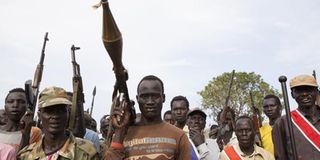Will South Sudan’s latest ceasefire deal usher in healing? The world is watching

Members of the White Army, a South Sudanese anti-government militia, attend a rally in Nasir on April 14, 2014. FILE PHOTO | ZACHARIAS ABUBEKER
What you need to know:
- Igad has given the two rivals, Dr Riek Machar and President Salva Kiir, 45 days to forge a unity government, this time with some seemingly tough threats.
- Is there hope for South Sudan? Of course there is.
- Igad and all other actors, and more specifically its neighbours, have the answer.
Eight months since hell broke loose in Juba with the sons and daughters of South Sudan massacring one another, the nation sinks deeper into humanitarian crisis.
The warring sides signed a cessation of hostilities agreement under the auspices of Igad. This is the fourth since the conflict started. Three previous ceasefire agreements were broken within hours.
Igad has given the two rivals, Dr Riek Machar and President Salva Kiir, 45 days to forge a unity government, this time with some seemingly tough threats.
Ethiopia’s Prime Minister Haile Mariam Desalegn is quoted to have stated: “As a region, we have to show any party which violates the agreement that there are consequences.”
LITTLE ATTENTION
Africa’s newest nation is bleeding to death with little attention from the rest of world.
While focus is directed towards the Russian-Ukraine rivalry, the Islamic States violence and Ebola in West Africa, South Sudan quietly bleeds.
The World Food Programme and the Food and Agriculture Organisation estimate that out of a population of 12 million, seven million are food insecure — 3.9 million of them severely food insecure.
Large parts of Jonglei, Unity and Upper Nile states are already in a humanitarian emergency.
According to Unicef, more than 50,000 children under the age of five risk dying of malnutrition. There is a widespread outbreak of cholera — nearly 6,000 cases — with fatality rates above emergency.
The rainy season is making the situation worse, preventing aid from reaching many of the needy people.
In addition, farmers missed the planting season due to the fighting that disrupted the distribution of seeds leading to a 30 per cent reduction in national food production.
According to the Inter-Agency Refugee Response, more than 438,000 South Sudanese have fled to neighbouring countries and if things do not change, the total number of refugees is expected to reach 710,000 by the end of the year.
NEIGHBOURS HAVE THE ANSWER
Is there hope for South Sudan? Of course there is.
Igad and all other actors, and more specifically its neighbours, have the answer.
The time has come to stop handling both Dr Machar and President Kiir with kid gloves; it is no longer about their political differences.
African Union and regional states must demonstrate to the world their commitment to peace and stability in the Horn of Africa by acting tough.
Stiff sanctions must be imposed on any persons not keen on peace. These should include travel bans, seizing of bank accounts, houses, cars, and any other assets owned by any persons slowing down the peace process.
There should be total removal of potential obstacles to enable importation of equipment, drugs, recruitment of expatriate staff and facilitation of humanitarian organisations to work so as to effectively respond to the humanitarian crisis.
The International Red Cross, the UN Office for the Coordination of Humanitarian Affairs (OCHA), the European Union’s Special Representative for the Horn of Africa, and all others involved directly or indirectly, in the South Sudan peace process must be supported as they re-energise the humanitarian intervention.
Aid agencies have the duty to ensure that delivery of humanitarian assistance is based on independently assessed and verified needs. Such assistance must target those in greatest need, and delivered in an impartial, independent manner.
Why would President Kiir’s and Dr Machar’s aides be allowed to move freely within the region facilitating the fighting on the ground?
Why would banks in the region continue to facilitate their transactions that are procuring logistics that fuel the fighting?
Why shouldn’t they be banned from their palatial homes in Nairobi, Kampala and Addis Ababa until they respect what they agree upon?
A roadmap for national healing and reconciliation must be put in place to secure the future of South Sudan.
Tough interventions will go a long way in averting a full-scale humanitarian tragedy while securing a South Sudan that the world envisioned on July 9, 2011.
Mr Symon is a lawyer and the executive secretary, International Friends of South Sudan [IFOSS] Global Secretariat ([email protected])




